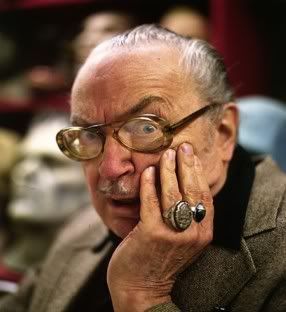The first geek ever died last week on December 4, 2008 at the age of 92. His name was Forest J. Ackerman, and he started geek culture as we know it. People may be shocked to find that there was actually a beginning to modern geekdom, but it’s true that there was. There will also be an end, by the way, because we just aren’t fucking and producing children at the same rates as those jock assholes. Time never stops for anyone; Ackerman’s death is a reminder of that. Time will march on and one day, you’ll be talking to someone who had never heard of Boris Karlof or Thundercats or Forest J. Ackerman, and you will want to choke the shit out of that person. Time always leads to forgetfulness and oblivion. Today we look back at the life that had been an inspiration to such creators as Ray Bradbury, Ray Harryhousen, Stephen King, and unfortunately L. Ron Hubbard. Today we fight the passage of time by remembering Forest.

Forest was born on November 24, 1916. But he was truly born (no, not by allowing Jesus into his heart) but when he saw his first “imagi-movie” in 1922, One Glorious Day. Everybody reading this remembers their first time experiencing Star Wars – and wasn’t that really the day you were first truly alive? One Glorious Day was his Star Wars. Okay, if Star Wars was around in 1922, Star Wars would be his Star Wars, but you get the point.
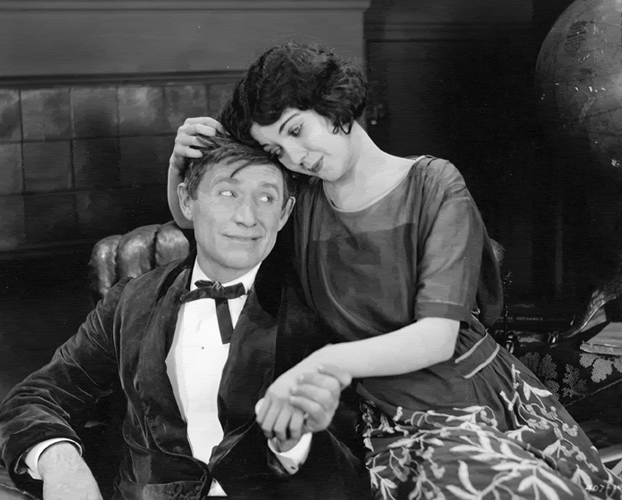 |
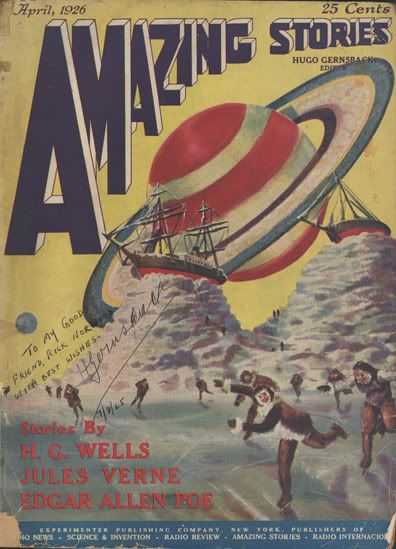 |
|
A still from One Glorious Day. The actual plot is just as exciting as this photo, meaning not very.
|
The premiere issue of Amazing Stories. |
The other moment of his young life that pushed him over the edge and into the geek abyss was the moment he bought his first science fiction magazine, Amazing Stories, in 1926. Three years later, in 1929 he had his first letter published in Science Wonder Quarterly. That same year he entered into a contest held by the San Francisco Chronicle and won with his story about a voyage to Mars. People apparently were only allowed to write science fiction stories about Mars back then. Also, in 1929, he founded The Boys’ Scientifiction Club; which sounds like the geeky Little Rascals. He even mastered the made up language of Esperanto (Nerd Fact: In 1965 William Shatner stared in the Movie Incubus, the second movie to be performed entirely in Esperanto) – he was that nerdy.
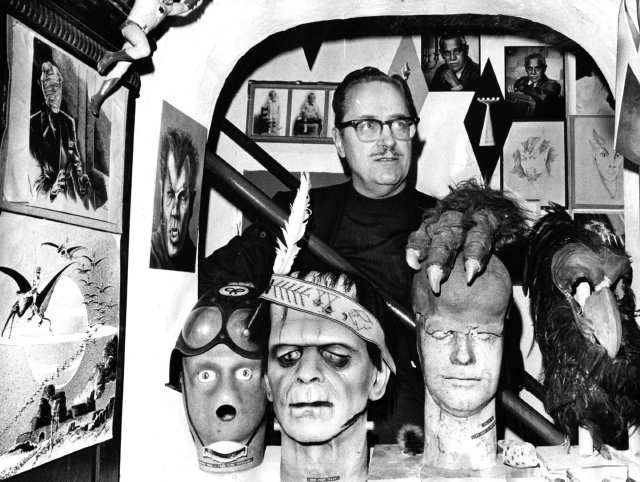
Ackerman joined up with a few friends and started the first fan magazine to be solely dedicated to science fiction, the Time Traveler, and a chapter of the Science Fiction Society in 1932. They would meet at Clifton’s Cafeteria in downtown L.A., though they couldn’t afford to eat there. Just like teenagers hanging out at coffee shops today, some things never change. This would become the now legendary Clifton’s Cafeteria Science Fiction Club. Forest placed a flyer for his science fiction club in an L.A. bookstore. The person who would show up because of that flyer was a teenage Ray Bradbury. Ackerman would be the first to publish Bradbury in their group’s fan publication, Imagination! in 1938. He even loaned Bradbury the $90 to start his own publication Futuria Fantasia, in 1939. This would be a running fixture of their relationship where Bradbury would need money and Forest would gladly let Ray mooch off of him. We’ve all had friends like that, but maybe one day they will become a sci-fi God and one day pay you back, if only we hope hard enough.
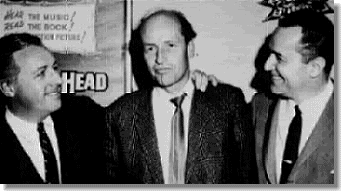 |
| Ray Bradbury, Ray Harryhausen and Forest J. Ackerman. |
In conjunction with the New York World’s Fair, the first ever World Science Fiction Convention (Worldcon) was held in the Caravan Hall in New York from July 2 to July 4, 1939. Nerds and Geeks from all over the country converged on the Big Apple like they do on San Diego today. The theme of the convention was “The World Of Tomorrow” a phrase everyone had to yell out in an overly dramatic tone. Forest would show up in costume. His girlfriend at the time, Myrtle R. Douglas, designed and sewed the costumes, one for Forest and one for herself. This was the first time anyone did such a thing. From all those Klingons and Trekkies, to the underage hotties in anime gear, right down to the guy who made his unwilling girlfriend dress up like Emma Frost just so he could wear his Cyclops costume and accidentally pop a boner in it owes it all to this one moment.
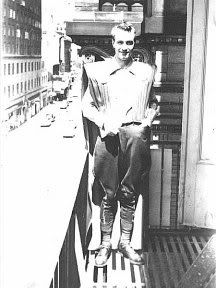 |
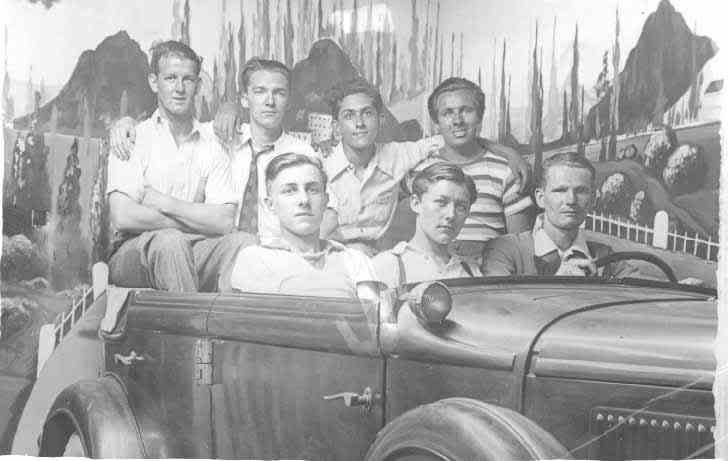 |
| The first cosplayer. You would totally do him. |
At the first Worldcon fans took time away from “The World Of Tomorrow” to visit Coney Island: Front: Mark Reinsberg, Jack Agnew, Ross Rocklynne Top: V. Kidwell, Robert A. Madle, Erle Korshak, Ray Bradbury. |
He walked the streets of New York and young boys would point and yell, “Buck Rodgers!” or “Flash Gordon!” or “Loser!” (That last one was just a joke, this was actually cool back then). In a 1996 interview with Ed Grant of the New York City cable access show Media Funhouse, he recounted a moment with a nearby Esperanto convention, “”They had an Esperanto convention, the artificial language, which I know…So I was in this futuristic costume and I went up and explained in Esperanto that I was a time traveler from the future.” Even in those early days of conventions there are some traditions that existed then as they do today – namely how fuckin’ expensive food was and is. In a convention of 165 attendees Ackerman recalled, “We had a banquet so expensive that only 29 of us could afford it… I couldn’t even afford to lend the money to Ray Bradbury, ‘cause it was one dollar a plate. Of course no food, you understand, just a dollar for a plate.”
 |
| Some things never change. The $11.00 pizza at Comic-Con, at least the box is free with purchase |
He coined the term “sci-fi” in 1954 while listening to the radio, “My wife and I were listening to the radio, and when someone said ‘hi-fi’ the word ‘sci-fi’ suddenly hit me,” Ackerman said in a Times interview in 1982. “If my interest had been soap operas, I guess it would have been ‘cry-fi,’ or James Bond, ‘spy-fi.”
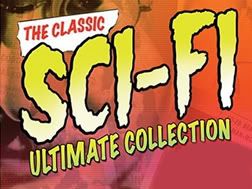
Throughout the course of his career, he: published over 50 stories, became a literary agent to Ray Bradbury, Isaac Asimov, A.E. Van Vogt, H.L. Gold, Ray Cummings, Hugo Gernsback and (again, unfortunately) fuckin’ L. Ron Hubbard (no offense to any Scientologists out there, his books just sucked), created Vampirella. After all this, he would forever be remembered for his magazine, Famous Monsters of Filmland. The magazine used photos from his own collection and featured the behind-the-scenes special effects creators and stop motion geniuses of the time. In his magazine he was nick named “Uncle Forry,” Famous Monsters of Filmland, though riddled with silly puns like “The Printed Weird” and “Fang Mail”, inspired a whole generation of film creators the likes of Peter Jackson, Steven Spielberg, Tim Burton, Stephen King, and countless other writers, directors, artists and craftsmen.
Through the 1980’s up until about 2002 he opened the doors to the “Ackermansion”. The “Ackermansion” was a museum of his own personal collection of sci-fi and horror memorabilia. It contained over 50,000 books, thousands of science-fiction magazines, and most notably Bela Lugosi’s cape from the 1931 film “Dracula.” Uncle Forry opened his doors every Saturday and gave a tour for anyone who wanted one. An exuberant man, even at his old age, he would retell stories about the golden age of science fiction history. “My wife used to say, ‘How can you let strangers into our home?’ But what’s the point of having a collection like this if you can’t let people enjoy it?” he said to the Associated Press as he did an enthusastic tour of his home.
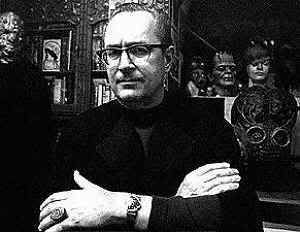

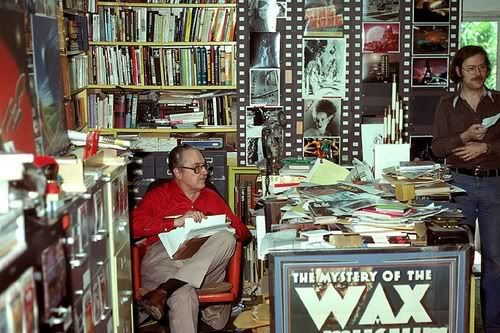
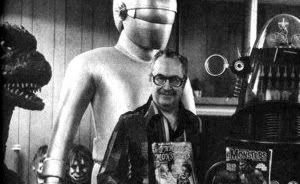
As I stated before, Uncle Forry, Mr. Science Fiction, Dr. Acula, died December 4, 2008. He died surrounded by friends and spent his last few days tying the loose ends of his life. The following is a quote from www.time.com: “It would be nice to look forward to going to a Great Sci-Fi Convention in the Sky when I expire,” he wrote. “I am vaguely contemplating opting for a cryogenic comeback, but in case I don’t become a human people-cicle, I, like Isaac Asimov and other thinkers I admire, don’t expect to wake up in some spirit realm of an afterlife. I’ve been a secular humanist since I was 15, long before the term was invented, and nothing since has changed my mind.” I wouldn’t sully his beliefs by saying that he is in a better place because he didn’t believe in such a thing; he will, however, live on in our hearts well into the world of tomorrow.
